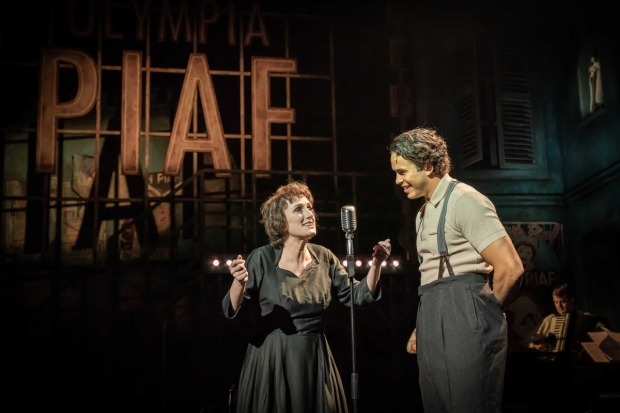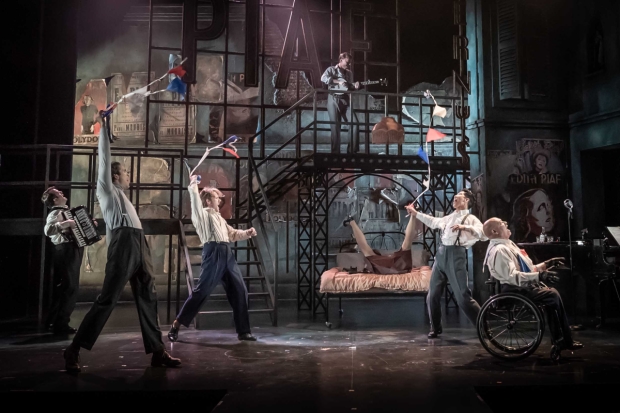
© Marc Brenner
Pam Gems' play, Piaf, has well over 40 years of international success behind it – we are never far from a major production somewhere in the world – yet in many ways it's not very good, so episodic as to amount almost to a comic strip in the first half and never able to resist the next cliché. The answer to its success lies in the skilful deployment of some superb songs with huge emotional impact and in a monster of a part for an actor capable of putting over those songs and with the skill and commitment to make a highly unflattering part her own.
In the current production which originated at Nottingham Playhouse, it's Jenna Russell's turn to put on the black dress and the neuroses and addictions that go with it – and her performance is compelling, even though quite often we're not terribly interested in the people around her.
Piaf tries to contain within the two hour traffic of the stage all her life, from being discovered as an urchin singing in the street, name-changed from Edith Gassion to Piaf, via stardom and tragic love affairs to addiction (to drugs and young men most dangerously), to death at the age of 47. Billie Holiday, whose life took a not dissimilar trajectory, expressed her credo in the song "Don't Explain" – and Gems doesn't explain, probably wisely, but some of the time she hardly bothers to narrate. World War Two passes in a conversation with two gullible German soldiers and, though Marcel Cerdan gets more time and a cleverly choreographed boxing match, it's helpful to know his story in advance.

© Marc Brenner
Adam Penford's production deploys limited numbers skilfully, eight actors besides Russell taking on scores of characters, musical director Gareth Valentine supplying an elegant piano accompaniment from down stage left, aided by admirable instrumental contributions from the cast. Musically the production is very strong in every way.
One element of the production that is more problematic is the degree of Anglicisation. No one wants Allo Allo-type accents, but the array of mockney voices at the outset is a little off-putting, like Half a Sixpence with added simulated sex. At the same time the clichéd identification of character by costume and gesture – bad tough guys wear caps, drink beer from the bottle and have cigarettes in their mouths – means that we are relying on Piaf herself to make us believe.
Jenna Russell delivers, though she, too, runs into the English/French dilemma. Her performance of the Piaf songs is superbly intense, still, concentrated, her French (in the judgement of a non-Francophone) excellent. However, Russell and Penford decided to perform some of the lyrics in translation to aid audience comprehension – in theory, at least, a good idea – but Russell sounds less Piaf in translation and starting "Hymne a l'Amour" in English certainly dilutes a great song.
Russell aside, acting honours go to Laura Pitt-Pulford, with a controlled, almost under-stated, highly sympathetic double of Marlene Dietrich and Piaf's correct secretary, Madeleine. Sally-Ann Triplett's blowsy Toine, Edith's partner on the streets, mellows impressively, eventually calling to mind – for those of us of a certain age – the deliciously comic Dora Bryan. The men remain pretty anonymous (probably due to the text, not the production), but Matthew Woodyatt registers as Charles Aznavour, sings well and brings that irresistible accordion sound to many of the songs.












